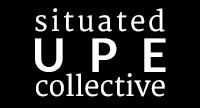In a new article, SUPE members Joseph Pierce, Mary Lawhon, and Anesu Makina reflect on theorizations of urban appropriation in South African urban contexts. Engaging with Lefebvrian theorizations of the ‘Right to the City‘ as well as Bayat’s idea of ‘quiet encroachment,’ the authors argue that actors in South Africa operate using a different model of appropriation. They note that urban actors in South Africa often act in ways that could be characterized as appropriative, yet do not work to consolidate a right to occupy or appropriate land founded on durable permission. These acts are, they argue, not adequately explained as apolitical or individualistic even as the logic used to justify them is often based neither on rights nor needs.
Drawing from these dynamics, the authors propose a ‘third’ mode of urban appropriation, alongside Lefebvre’s and Bayat’s, that they argue is present in South African cities. They label such appropriation ‘agonistically transgressive,’ and argue that it can be tentatively defined by three conceptual characteristics:
- Agonistic transgression is not oriented toward securing use of the city in an ongoing way, but entails always-ongoing efforts to appropriate. Agonistically transgressive appropriation thus deflects rhetorical efforts by both state and private actors to invoke authoritative adjudication or closure, because closure (whether ultimately advantageous or disadvantageous) is not how appropriation proceeds.
- Relatedly, agonistic transgression is not understood by actors as playing by any one specific set of agreed-upon rules—even rules outside of the law—but is instead seen as essentially transgressive of efforts to enumerate rules and order. In this way agonistic transgression troubles official claims of law and order, instead cultivating an ethic of the presently-possible based on the limits of state and private regulation. Such actions are not, however, the kind of spontaneous actions described by Bayat but instead are underpinned by broader rationalities
- Agonistic transgression is a mode of appropriation which both employs contemporary loci of political conflict while also identifying and cultivating new conflicts. The ongoing/unfolding process of appropriation involves an endless probing of physical and political landscapes for vulnerable disagreements between empowered actors about what the rules of the urban game really are: these disagreements constitute locations where opportunities exist for current or future acts of appropriation.
For the authors, engaging with these particular models of urban appropriation is critical to avoiding the overuse of scholarly concepts, whether derived from the global North or South. They note that:
Collectively, these moments of interstitial transgression substantively (re)make the logics of urban circulation and use. The formal spatial logics of capital and the state have often capitulated to the logics of incremental agonistic transgression—at least for a time, and at least in some places. While the abilities of both the state and capital to regulate space are always partial and contested, contestation is particularly evident in the dynamic urban conditions of post-apartheid South Africa. We argue that agonistic transgression is, therefore, particularly salient in South Africa, but may occur anywhere that contestations over space occur (i.e. anywhere). Analytically, our core concern is that researchers inquire into different modes of urban appropriation rather than beginning with a priori frameworks.
Using examples of urban land appropriation for housing in South Africa, the authors illustrate how thinking pluralistically about urban appropriation might help better understand its actually existing forms in—and beyond—the global South. As they note, “Our aim is to push back against overbroad claims and make room for more specific theories of urban participation and reproduction rooted in justificatory logics that are place-specific, and increase our insight into the production and contestation of spatial orders.”
